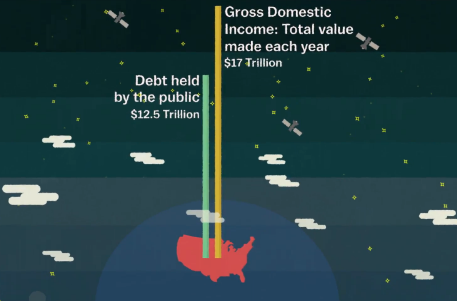Is Matt Yglesias' debt video 'left-wing propaganda'?

Yesterday, a new one-and-a-half-minute economics video from Ezra Klein's newly formed Vox Media hit the internet. In it, Vox Executive Editor Matt Yglesias explained why the current level of the national debt is neither dangerous nor worrying:
He concludes that "debt just isn't a problem right now," because inflation is currently near historic-lows.
The video stirred up some pretty angry responses from people who think that debt is a problem right now. Red State's Erick Erickson claims some of the video is incorrect and calls Yglesias a liar who is spreading "left-wing propaganda."
The Week
Escape your echo chamber. Get the facts behind the news, plus analysis from multiple perspectives.

Sign up for The Week's Free Newsletters
From our morning news briefing to a weekly Good News Newsletter, get the best of The Week delivered directly to your inbox.
From our morning news briefing to a weekly Good News Newsletter, get the best of The Week delivered directly to your inbox.
Erickson contends that: "[Yglesias] tries to explain the National Debt and out of the gate begins with a lie. He claims the national debt is $5 trillion less than the U.S. Treasury says it is."
But Yglesias is pretty clear that he's excluding debt owed from one arm of the government to another, and only including federal debt held by the public. That is completely rational. After all, money the government owes to itself is simply money moved from one side of the government balance sheet to the other. There's nothing dishonest or disingenuous about citing the lower figure that only includes debt held by the public, especially given that Yglesias was clear about this.
Erickson then contends that: "[Yglesias] uses deficit and debt interchangeably."
But the debt is just the sum of the deficit over many years. So there's nothing wrong with treating them as two manifestations of the same thing so long as you understand that one is an annual figure and the other is the total. Yglesias' point is that the reason to worry about deficits is when they lead to elevated inflation and interest rates, something which we are not currently experiencing. This bases the assessment of debt and deficits around the real world consequences of debt and deficits, instead of hand-wringing over the size of the number, which seems to be what Erickson would rather have us do.
A free daily email with the biggest news stories of the day – and the best features from TheWeek.com
Erickson's next point is that: "[Yglesias] claims the U.S. government can never run out of money."
This, of course, is true. The U.S. government is a monetary sovereign that controls its own state-backed fiat money. Does Erickson think this is untrue? Does he think that the U.S. government can run out of paper and electronic dollars? Does Erickson think that the U.S. is back on the gold standard and therefore can run out of money?
Erickson concludes: "This isn't education. It is not explaining. It is left-wing propaganda. It is also sponsored by General Electric. Why is General Electric sponsoring left-wing propaganda?"
Now, to be fair, I'm not sure Yglesias' video will change many minds. It crams in a baffling quantity of information into a relatively short period. Viewers might on first viewing find it more confusing than enlightening, especially given that the mainstream narrative of the terribleness of government debt and deficits has become so deeply ingrained as "common knowledge."
But everything in the video is technically correct. At the very least it has succeeded in sparking a public debate on the issue of the national debt. And it is very definitely not left-wing propaganda, no matter how much Erick Erickson and other debt fearmongers would like it to be.
John Aziz is the economics and business correspondent at TheWeek.com. He is also an associate editor at Pieria.co.uk. Previously his work has appeared on Business Insider, Zero Hedge, and Noahpinion.
-
 ‘The sport is still run on a shoestring’
‘The sport is still run on a shoestring’Instant Opinion Opinion, comment and editorials of the day
-
 3 tips to help protect older family members from financial scams
3 tips to help protect older family members from financial scamsthe explainer Prevent your aging relatives from losing their hard-earned money
-
 Will Trump’s oil push end Cuba’s Communist regime?
Will Trump’s oil push end Cuba’s Communist regime?Today’s Big Question Havana’s economy is teetering
-
 TikTok secures deal to remain in US
TikTok secures deal to remain in USSpeed Read ByteDance will form a US version of the popular video-sharing platform
-
 Unemployment rate ticks up amid fall job losses
Unemployment rate ticks up amid fall job lossesSpeed Read Data released by the Commerce Department indicates ‘one of the weakest American labor markets in years’
-
 US mints final penny after 232-year run
US mints final penny after 232-year runSpeed Read Production of the one-cent coin has ended
-
 Warner Bros. explores sale amid Paramount bids
Warner Bros. explores sale amid Paramount bidsSpeed Read The media giant, home to HBO and DC Studios, has received interest from multiple buying parties
-
 Gold tops $4K per ounce, signaling financial unease
Gold tops $4K per ounce, signaling financial uneaseSpeed Read Investors are worried about President Donald Trump’s trade war
-
 Electronic Arts to go private in record $55B deal
Electronic Arts to go private in record $55B dealspeed read The video game giant is behind ‘The Sims’ and ‘Madden NFL’
-
 New York court tosses Trump's $500M fraud fine
New York court tosses Trump's $500M fraud fineSpeed Read A divided appeals court threw out a hefty penalty against President Trump for fraudulently inflating his wealth
-
 Trump said to seek government stake in Intel
Trump said to seek government stake in IntelSpeed Read The president and Intel CEO Lip-Bu Tan reportedly discussed the proposal at a recent meeting